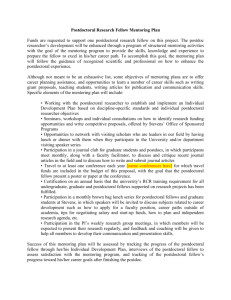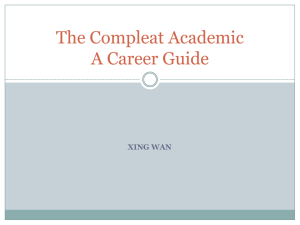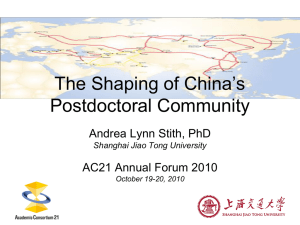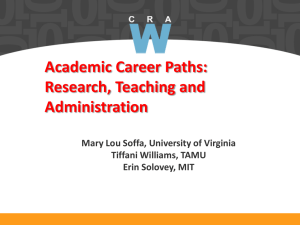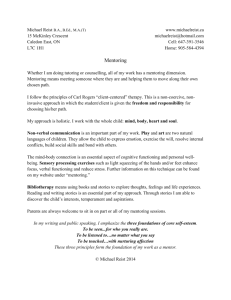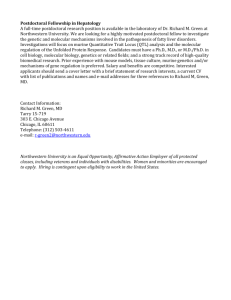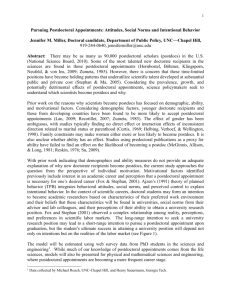Postdoctoral Mentoring Plan Discussion and
advertisement
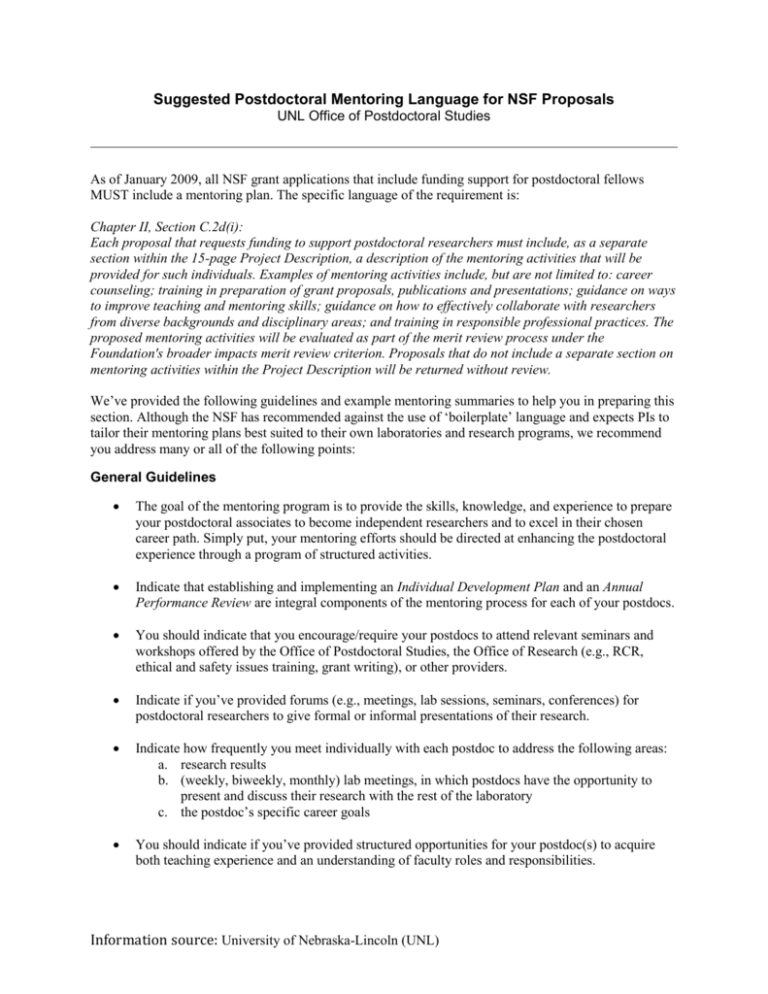
Suggested Postdoctoral Mentoring Language for NSF Proposals UNL Office of Postdoctoral Studies As of January 2009, all NSF grant applications that include funding support for postdoctoral fellows MUST include a mentoring plan. The specific language of the requirement is: Chapter II, Section C.2d(i): Each proposal that requests funding to support postdoctoral researchers must include, as a separate section within the 15-page Project Description, a description of the mentoring activities that will be provided for such individuals. Examples of mentoring activities include, but are not limited to: career counseling; training in preparation of grant proposals, publications and presentations; guidance on ways to improve teaching and mentoring skills; guidance on how to effectively collaborate with researchers from diverse backgrounds and disciplinary areas; and training in responsible professional practices. The proposed mentoring activities will be evaluated as part of the merit review process under the Foundation's broader impacts merit review criterion. Proposals that do not include a separate section on mentoring activities within the Project Description will be returned without review. We’ve provided the following guidelines and example mentoring summaries to help you in preparing this section. Although the NSF has recommended against the use of ‘boilerplate’ language and expects PIs to tailor their mentoring plans best suited to their own laboratories and research programs, we recommend you address many or all of the following points: General Guidelines The goal of the mentoring program is to provide the skills, knowledge, and experience to prepare your postdoctoral associates to become independent researchers and to excel in their chosen career path. Simply put, your mentoring efforts should be directed at enhancing the postdoctoral experience through a program of structured activities. Indicate that establishing and implementing an Individual Development Plan and an Annual Performance Review are integral components of the mentoring process for each of your postdocs. You should indicate that you encourage/require your postdocs to attend relevant seminars and workshops offered by the Office of Postdoctoral Studies, the Office of Research (e.g., RCR, ethical and safety issues training, grant writing), or other providers. Indicate if you’ve provided forums (e.g., meetings, lab sessions, seminars, conferences) for postdoctoral researchers to give formal or informal presentations of their research. Indicate how frequently you meet individually with each postdoc to address the following areas: a. research results b. (weekly, biweekly, monthly) lab meetings, in which postdocs have the opportunity to present and discuss their research with the rest of the laboratory c. the postdoc’s specific career goals You should indicate if you’ve provided structured opportunities for your postdoc(s) to acquire both teaching experience and an understanding of faculty roles and responsibilities. Information source: University of Nebraska-Lincoln (UNL) Indicate if you provide travel support for postdocs to attend local, regional, national, and/or international scientific meetings to facilitate their training and provide networking opportunities. You should also indicate that the success of your mentoring plan will be evaluated by tracking postdoctoral associates through their Individual Development Plans, conducting periodic interviews to assess associates’ satisfaction with the mentoring program, and tracking progress toward career goals after finishing their postdoctoral training at UNL. The two, very different sample mentoring summaries below reflect adaptations of examples provided in 2008 by the Federation of American Societies for Experimental Biology (FASEB). Although the examples are discipline specific, you can readily adapt the content––or include your own specific aspects––to fit your research field. What’s important here is the overall approach used to clearly illustrate an effective and persuasive mentoring program. Example 1 Postdoctoral scholars working in my laboratory will conduct research on the neuronal processes involved in Pavlovian fear learning. Under my mentorship, they will learn to formulate and test hypotheses related to the acquisition, consolidation, and retrieval of fear memories; develop expertise in behavioral and neurobiological techniques including intracranial drug infusion, single-unit and slice electrophysiology, and immunocytochemical analysis; and acquire expert knowledge of the scientific literature in our research area. At the start of their training, postdocs will be required to provide the Office of Postdoctoral Studies (OPS) with relevant contact information so they receive announcements of upcoming training seminars and events offered by OPS and the Office of Research; attendance at these professional and career development seminars will serve to supplement the individualized mentoring I provide. Postdocs will also be encouraged to make use of the extensive professional and career development resources on both the OPS (www.unl.edu/postdoc) and the National Postdoctoral Association (NPA) websites. UNL is a sustaining member of the NPA. To foster open and clear communication with my postdocs, I will provide each with the Compact Between Postdoctoral Appointees and Their Mentors (attached), which describes the commitments both they and I make to ensure an effective postdoctoral training experience. We will discuss these expectations and the steps we will take to achieve the goals of the Compact at the start of the postdoctoral appointment. On an individual basis, we will also collaboratively complete an Individual Development Plan (attached) to help postdocs identify both their short- and long-term goals and the skills and abilities needed to achieve them. Used in conjunction with the Annual Performance Review (attached), the IDP will serve as an iterative mentoring tool that will help establish an ongoing, productive mentor-mentee partnership characterized by mutual respect and understanding. Because effective communication of research findings is an essential component of scientific success, I will help my postdocs hone their communication skills by having them write research articles and develop oral and poster presentations for lab meetings, department seminars, and scientific meetings. I will also help them prepare their own research grants and involve them in the development of mine. Finally, I believe that all trainees benefit from the perspectives and guidance of multiple mentors; therefore, while I will serve as my postdocs’ primary advisor and mentor, I will encourage them to seek additional mentors within and outside our institution. Example 2 Scientific and technical skills Postdocs will contribute to research on the role glutamate-dependent neuronal plasticity plays in addiction to psychostimulant drugs such as cocaine and amphetamine. They will work under my guidance and with assistance from senior lab members and faculty collaborators to develop the scientific and technical skills necessary to carry out this research program. In the course of this research, they will develop expertise in behavioral and biochemical techniques, including drug self-administration, immunocytochemical analysis, BS3 assay, SDS-PAGE, and Western blotting. These skills will have broad applicability to other areas of research and will be an immense benefit to postdocs as they establish their own laboratories. Postdocs will add to their scientific knowledge by reading and discussing scientific literature with me and other members of the lab and participating in journal clubs and seminars related to this research. Career planning and professional development I will work with postdocs to design an individual development plan describing their research, training, and career goals as well as the approaches they will take to achieve those goals. We will review and revisit this plan on a regular basis. I will meet weekly with postdocs to discuss their progress on research projects and to identify and resolve any difficulties carrying out their work. Postdocs will be encouraged to attend workshops on responsible conduct of research, career opportunities, resume writing, and interview skills. Communication skills Postdocs will improve their ability to communicate research findings by presenting and obtaining feedback on their research at regularly scheduled lab meetings. Postdocs will also have an opportunity to present their research at our weekly departmental colloquium series at which faculty, graduate students, postdocs, and invited speakers present on a rotating basis. Postdocs will be encouraged to give poster and oral presentations during the Experimental Biology annual meeting. I will help postdocs enhance their writing skills by working with them to develop research reports and review articles. Postdocs will be invited to join me in teaching a freshman seminar on our research topic. This will give them experience presenting complex scientific information to an audience of non-experts, and it will provide valuable teaching experience. Grants management I will involve postdocs in the preparation of new grant applications and competing renewals. I will encourage postdocs to apply for independent research support, such as a National Science Foundation postdoctoral fellowship or a National Institutes of Health Pathway to Independence award. I will provide guidance as they develop these grant applications. Laboratory management Postdocs will be required to receive training in lab safety, animal care and use, and responsible conduct of research. Postdocs will be involved in day-to-day management of lab operations (e.g., ordering laboratory supplies, overseeing the lab budget, maintaining research equipment and facilities, ensuring compliance with safety standards). Postdocs will be involved in training and mentoring undergraduate and graduate students. Postdocs will have a role in recruiting and interviewing new students and employees to the lab. Additional Background Information: UNL Office of Postdoctoral Studies (OPS) At the University of Nebraska-Lincoln (UNL), the postdoctoral experience emphasizes scholarship, continued research training, and career development under the oversight of a faculty mentor. The UNL Human Resources Department presents a monthly New Employee Orientation; the International Affairs Office hosts a New International Scholar Orientation designed for postdoctoral associates as well as graduate students. UNL is a sustaining member institution of the National Postdoctoral Association. All UNL PIs, faculty, and postdoctoral appointees are eligible for free membership in the organization and to access the extensive mentoring materials on the organization’s website. Based on the results of a fall 2008 formal needs assessment, the OPS sponsors a variety of events, seminars, and luncheon speakers each academic year on a range of postdoc professional skills and career development interests including, but not limited to, curriculum vitae and cover letter writing, interviewing for academic and industry positions, mentoring undergraduate and graduate students in the laboratory, and faculty roles and responsibilities. - During last year’s Research Fair, PIs and postdocs heard Dr. Trevor Penning (University of Pennsylvania) address the specifics of the Individual Development Plan in mentoring postdocs. - At this year’s Research Fair postdoc/PI luncheon, Cathee Johnson Phillips, the Executive Director of the National Postdoctoral Association, will overview the expected core competencies of postdoctoral training. OPS maintains a website (http://www.unl.edu/postdoc/) that provides resources and support for both new and current postdocs and their PIs. UNL postdocs may choose to participate in the Preparing Future Faculty (PFF) program, a professional development opportunity for those interested in pursuing a faculty position. Supervising undergraduate research projects is an excellent way for postdocs to gain experience supervising research students. At UNL, postdocs have the opportunity to mentor undergraduate researchers through the McNair Scholars Program. The UNL Office of Research offers a range of workshops open to postdoctoral researchers as well as to other researchers on various topics related to finding research funding opportunities and writing competitive research proposals. The Office of Postdoctoral Studies offers one‐on‐one consultations with PIs to help them develop a postdoc mentoring plan that best fits the proposed project and situation. Example Postdoctoral Researcher Mentoring Plan for an NSF Proposal [Note: The following mentoring plan is provided as an example; however, the specific mentoring plan a PI develops should fit the project, the department’s goals, and the needs of the postdoctoral researcher(s) to be mentored.] One postdoctoral researcher will be funded on this project. The postdoctoral researcher’s development will be enhanced through a program of structured mentoring activities. The goal of the mentoring program will be to provide the skills, knowledge and experience to prepare the postdoctoral researcher to excel in his/her career path. To accomplish this goal, the mentoring plan will follow the guidance of the National Academies of Science and Engineering on how to enhance the postdoctoral experience, by providing a structured mentoring plan, career planning assistance, and opportunities to learn a number of career skills such as writing grant proposals, teaching students, writing articles for publication and communication skills [1]. Specific elements of the mentoring plan will include: Working with the postdoctoral researcher to establish and implement an Individual Development Plan based on the process developed by the FASEB [2] Seminars, workshops and individual consultations on how to identify research funding opportunities and write competitive proposals, offered by Texas A&M University’s Division of Research and Graduate Studies Office of Proposal Development [3] Participation in seminars and workshops on teaching and learning, as well as access to a teaching mentoring program, conducted by the Graduate Teaching Academy under the auspices of the NSFfunded Center for Integration of Research Teaching and Learning (CIRTL) and Texas A&M University’s Center for Teaching Excellence [4] Opportunities to network with visiting scholars who are leaders in our field by having lunch or dinner with them when they participate in the department’s visiting speaker series Participation in a journal club for graduate students and postdocs, in which participants meet weekly, along with a faculty facilitator, to discuss and critique recent journal articles in the field and to discuss how to write and submit journal articles Travel to at least two conferences each year [name conferences here] (travel funds are included in the budget), with the goal that the postdoctoral fellow present a poster or paper at the conference. Participation in a monthly brown bag lunch series for postdoctoral fellows and graduate students in our department, in which speakers will be invited to discuss subjects related to career development such as how to apply for a faculty position, career paths outside of academia, tips for negotiating salary and start-up funds, how to plan and independent research agenda, etc. Participation in the PI’s weekly research group meetings, in which members will be expected to present their research regularly, and feedback and coaching will be given to help all members to develop their communication and presentation skills. Success of this mentoring plan will be assessed by tracking the progress of the postdoctoral fellow through her/his Individual Development Plan, interviews of the postdoctoral fellow to assess satisfaction with the mentoring program, and tracking of the postdoctoral fellow’s progress toward his/her career goals after finishing the postdoc. [1] National Academy of Science, National Academy of Engineering, Institute of Medicine, “Enhancing the Postdoctoral Experience for Scientists and Engineers: A Guide for Postdoctoral Scholars, Advisers, Institutions, Funding Organizations, and Disciplinary Societies,” National Academies Press, 2000. [2] The Federation of American Societies for Experimental Biology, “Individual Development Plan for Postdoctoral Fellows,” http://www.faseb.org/ [3] http://opd.tamu.edu/ [4] http://cirtl.tamu.edu/tamu-cirtl/first-page.html Taken from : http://opd.tamu.edu/proposal-resources/resources-for-postdoc-requirement/resources-for-addressingnsfs-postdoctoral-mentoring-requirement Be aware that NSF has recommended against the use of ‘boilerplate’ language and expects that each PI will tailor a mentoring plan best suited to his/her own laboratory and research program. However, we recommend that you address many or all of the following points: You should indicate how frequently you meet individually with each post-doc to address the following areas: a. discuss research results, b. explicitly discuss his/her specific career goals c. [weekly, biweekly, monthly] lab meetings, in which post-docs have the opportunity to present and discuss their research with the rest of the laboratory. 3. Indicate if you provide travel support for post-docs to attend regional, national, and/or international scientific meetings to facilitate their training and to provide networking opportunities. 4. Indicate that you encourage/require your post-docs to attend relevant seminars and workshops on the “Responsible Conduct of Research” (RCoR). The OPA website provides a listing of seminars, publications and other relevant materials that address RCoR. Examples you could list include the UW Department of Bioethics and Humanities sponsored program entitled “Biomedical Research Integrity” (BRI) that explicitly addresses important issues of research integrity and research ethics. The BRI program was designed to meet the PHS requirement for instruction in the Responsible Conduct of Research in National Research Service Award Institutional Training Grants (NIH Guide, 1994), but is open to NSF fellows as well. The program annually covers the following topics: a) Conflict of interest, b) Data acquisition and ownership c) Peer review, d) Responsible authorship and e) Research misconduct. The BRI website provides links to local and national policies, sample cases with discussion, and current articles. Attendance at required lectures and discussion sections is recorded and subject to PHS review. Attendance is also reported to department chairs and Principal Investigators to monitor their trainees' participation. As noted above, the program is now available to NSF post-doctoral trainees. 5. If relevant, you should also indicate that you require your post-docs to attend training programs that address ethical and safety issues related to Human Subjects research and use of laboratory animals. The UW provides both ‘in person’ and/or web-based training modules for human subjects and animal use training requirements. 6. If your post-doc is interested in pursuing an academic career, you should help him/her identify workshops on grant proposal preparation, and/or register for class that offer training in proposal preparation. Such workshops are periodically offered through the School of Medicine and/or UW Libraries through the Research Funding Service. Taken from: http://depts.washington.edu/pdafrs/uwmentoring.html Examples of mentoring activities include, but are not limited to: career counseling training in preparation of grant proposals publications and presentations guidance on ways to improve teaching and mentoring skills guidance on how to effectively collaborate with researchers from diverse backgrounds and disciplinary areas training in responsible professional practices Investigators may seek to identify local resources and activities that provide mentoring opportunities (i.e. laboratory meetings and seminars, periodic individual meetings, participation in manuscript and grant proposal/preparation, etc.). Taken from: http://www.grad.wisc.edu/research/postdocs/postddocmentoring.html
